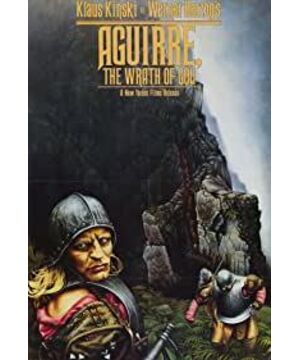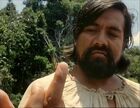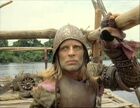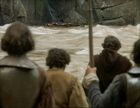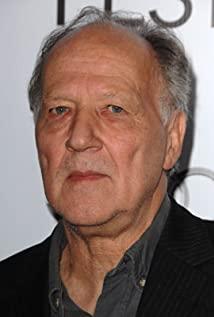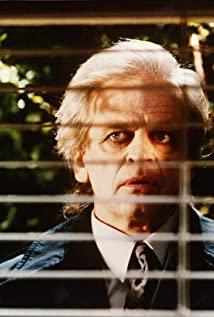This film review was also published on the WeChat public account "RUC Foreign Philosophy" of the Foreign Philosophy Teaching and Research Office of Renmin University of China, and the WeChat link is at the end of the article.
Compared with other new wave or new film directors, one of the representatives of New German Cinema, Werner Herzog, is unique in that he turned the process of making movies into reality. the process of. The manufacturing of reality is achieved through the "movement" of reality. In the documentary "Herzog Eats His Shoes" (1980), Herzog once expressed this view of cinema to young people who aspire to make movies: "Movies are sports, not aesthetics." The entire film crew moved to the Amazon tropical rainforest. When "Aguirre, God's Wrath" was filmed in an extremely harsh but extremely realistic natural environment, the film's formal framework had been built as a real "sport". The film was created. It has become an experiential replica of reality. This almost cynicist creative movement reached its zenith in his later work "Landing on the Boat" (1982).
As for the movie itself, the plot development of the entire movie can be regarded as a demonstration of a "self-destructive" process. This process unfolds as a story of a Spanish colonial expedition doomed to fail, because from the beginning of the movie, we have known that their expedition goal-"Golden Kingdom"-does not exist at all. In this journey destined to be linked to unnecessary consumption, there is a sense of futile emptiness everywhere-fruitless targets, enemies nowhere to be found, weak Indian flutes, and letting the moisture of the Amazon jungle blur the camera lens ...... The audience witnessed this colonial expedition struggling in the barbaric nature that was incompatible and incompatible with it. In the whole process, there was no serious battle or conquest. It is only self-political rehearsal, self-physical and mental consumption, and self-destruction in a certain “state of nature”. In short, there is only one type of “self-destruction”.
Regarding the "self-destruction" in the film, since its original purpose or starting point is that there is no signifier (the non-existent "Golden Kingdom"), there is nothing but the remnants of the illusion of the signifier in the symbolic order. Therefore, it has an inherently nihility side; however, from the other side, this "self-destruction" is not completely nihility, and is completely supported by illusion drive. It also has its "real" side, this "real" One side is about the role of "Aguirre" played by Claus Kingsley. I am not inclined to think that Aguirre is a villain on the level of drama (some critics believe that Aguirre is a metaphor for Adolf Hitler, but Herzog himself denies this view), as can be seen from the name of the movie , He is the Scourge of God, the Wrath of God, in other words, the punishment mechanism of the "God" higher than the human subject on the human subject. According to this logical clue, we see that Aguirre is first of all a symbolic projection of the savage desires of the explorers: he combines the obsession with the discovery of wealth, the enthusiasm for the spread of religion, and the addiction to ease and enjoyment. Then, when various desires are brutally but systematically gathered and organized together, a desire-like power mechanism is formed. The paradox is that this power mechanism that originated from human desires is actually a punishment mechanism of "God" against human desires. This kind of punishment represents that mankind once again created its own "backbone", and the result of the punishment is the final successive "self-destruction", which is "desires compete to destroy due to their desires."
As for the deep form of this desire-like power mechanism (which is also the actual punishment mechanism for desire), it is the "self presented in the form of superego" represented by Aguirre. One of the reasons for calling Aguirre a certain kind of id is that at the end, Aguirre said "I want to marry my biological daughter". "The desire for incest" is a confirmation and polarization of the nature of the id. ; As for the superego form, it is that Aguirre always tries to use institutionalized and orderly external methods-issuing decrees and setting up a monarch-to achieve his barbaric desires.
Finally, the ending of the movie is quite interesting. It seems to show such an ironic fact that the result of excess subjectivity: when the extremely powerful and infinite life energy "Superman" (that is, the only surviving Aguirre) becomes the last man (the last man), It becomes the last man (last man) accordingly. The reason is that when Aguirre became the surviving "last man", that is, the last man, since no one else exists, there is no need for the definite article "the" to exist. "The last man" (the last man) naturally becomes the "last man" (the last man) without the meaning of the definite article because of its "uniqueness". And this is what this film shows (or intends to express), the superman, or "the id in the form of the superego", has experienced the irony end of the "self-destruct" movement.
Philosophy and academy war "epidemic"丨 essay exhibition
View more about Aguirre, the Wrath of God reviews


